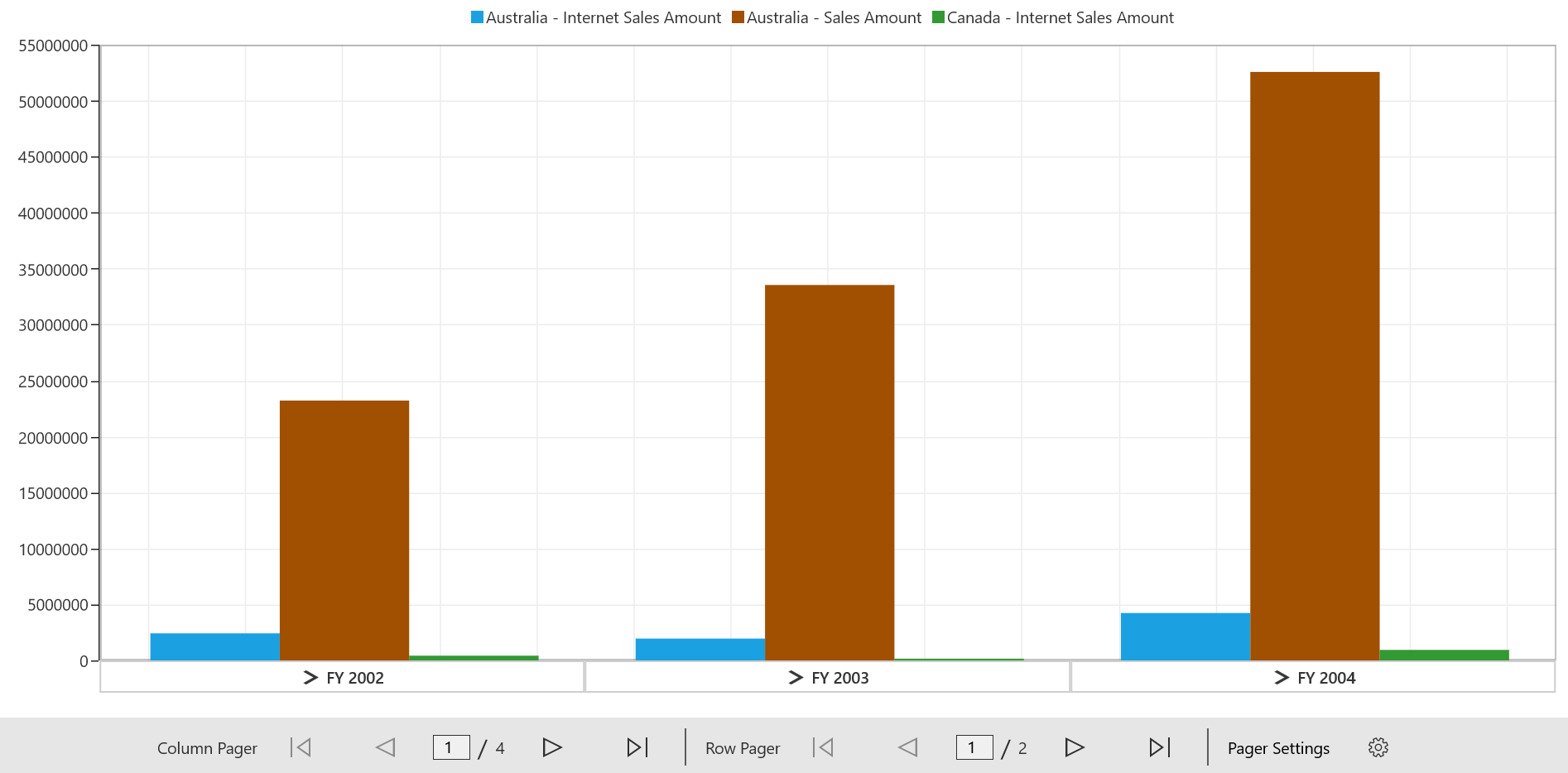Paging in UWP Pivot Chart (SfPivotChart)
7 Jan 20252 minutes to read
The SfPivotGrid supports loading and rendering the large amount of data without any performance constraint.
The SfPivotPager (custom control) is included and bound with the OlapDataManager of the respective SfPivotChart. To enable paging, set the EnablePaging property of OlapDataManager to true.
When you process a large CellSet, it is split into several number of segments and each segment is assigned and rendered in a separate page. You can navigate back and forth in all possible ways by using the UI options and you can also change the page size and page number dynamically with the help of settings available in the SfPivotPager.
NOTE
The assembly Syncfusion.SfPivotShared.UWP should be included from the installed location to add the SfPivotPager with SfPivotChart. You can also get the assemblies by browsing the default assembly location i.e.,
{System Drive}:\Program Files (x86)\Syncfusion\Essential Studio\<Version Number>\Assemblies for Universal Windows\10.0\
The following code snippet illustrates how to enable paging using the current OLAP report.
<Grid Background="{ThemeResource ApplicationPageBackgroundThemeBrush}">
<Grid.DataContext>
<local:ViewModel/>
</Grid.DataContext>
<Grid.RowDefinitions>
<RowDefinition Height="*"/>
<RowDefinition Height="Auto"/>
</Grid.RowDefinitions>
<pivotChart:SfPivotChart x:Name="PivotChart1" OlapDataManager="{Binding OlapDataManager}"/>
<pivotShared:SfPivotPager Grid.Row="1" OlapDataManager="{Binding OlapDataManager}"/>
</Grid>private void PivotChart1_Loaded(object sender, Windows.UI.Xaml.RoutedEventArgs e)
{
PivotChart1.OlapDataManager.CurrentReport.EnablePaging = true;
PivotChart1.OlapDataManager.CurrentReport.PagerOptions.CategoricalPageSize = 2;
PivotChart1.OlapDataManager.CurrentReport.PagerOptions.SeriesPageSize = 10;
PivotChart1.OlapDataManager.RaiseGetOlapDataWithTotalCount(new GetOlapDataWithTotalCountEventArgs
{
SerializedReport = Syncfusion.Olap.UWP.Common.Common.SerializeObject(PivotChart1.OlapDataManager.CurrentReport)
});
PivotChart1.OlapDataManager.NotifyElementChanged();
}Private Sub PivotChart1_Loaded(sender As Object, e As Windows.UI.Xaml.RoutedEventArgs)
PivotChart1.OlapDataManager.CurrentReport.EnablePaging = True
PivotChart1.OlapDataManager.CurrentReport.PagerOptions.CategoricalPageSize = 2
PivotChart1.OlapDataManager.CurrentReport.PagerOptions.SeriesPageSize = 10
PivotChart1.OlapDataManager.RaiseGetOlapDataWithTotalCount(New GetOlapDataWithTotalCountEventArgs() With { _
Key .SerializedReport = Syncfusion.Olap.UWP.Common.Common.SerializeObject(PivotChart1.OlapDataManager.CurrentReport) _
})
PivotChart1.OlapDataManager.NotifyElementChanged()
End Sub